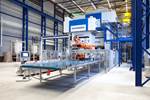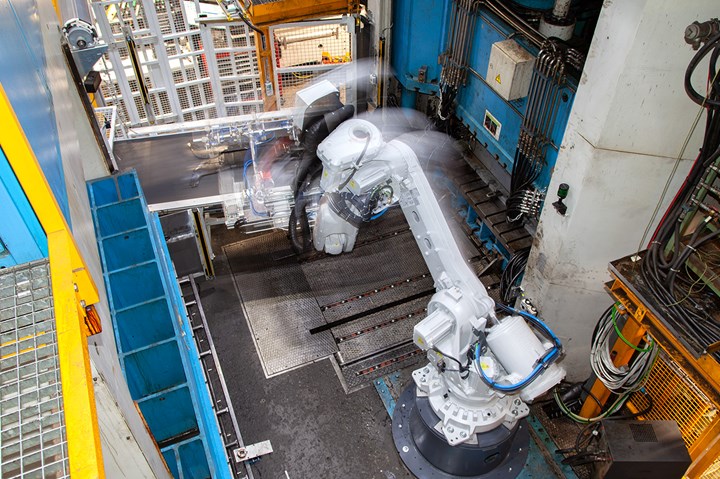Autoneum future-proofs GFRTP production with Evoris digitalization platform
Extensive plant modernization includes new automation and digitalization solutions procured from Dieffenbacher.
Dieffenbacher installed a new line control system that includes the safety PLC and three six-axis robots. Photo Credit: Dieffenbacher
Swiss company Autoneum (Winterthur) operates five Dieffenbacher (Eppingen, Germany) automotive component production lines at its Sevelen, Switzerland site. Together with Dieffenbacher, Autoneum has now extensively modernized one of the lines, a GMT/D-LFT line for glass fiber-reinforced thermoplastics (GFRTP). One highlight of the project was the introduction of the Evoris digitalization platform.
The modernized GMT/D-LFT line introduces a new line control system, including the safety PLC and three six-axis robots. In addition, various motion sequences of the loading and unloading robots were optimized. Reis robots were retired during the modernization; however, Autoneum says it was able to map its processes and comply with all safety requirements with the new robots despite the tight space conditions.
“We can now use our GMT/LFT-D system in a cycle-time-optimized manner,” Christoph Bless, head operational maintenance and repair at Autoneum, says. “The availability of the plant components is guaranteed.”
To further optimize production, Autoneum decided to implement the Evoris digitalization platform as well. Evoris uses artificial intelligence (AI) to make plants faster and more efficient. “Our goal is to operate our systems with high availability and as sustainably as possible while ensuring the right component quality,” Bless emphasizes. “Evoris gives us much better insights into our production and better possibilities to influence it.” The platform is said to be key to Autoneum’s sustainability, energy savings and profitability.
Bless calls Dieffenbacher’s expertise the decisive factor in moving forward with the digitalization project. “Dieffenbacher’s approach stands out from the crowd,” he continues. “They offer the complete package, everything from the platform to sensor technology and plant know-how to technologist knowledge for the entire production line. In addition, Dieffenbacher coordinated the entire integration. We look forward to their further development of Evoris.”
Autoneum uses Anomaly Detection, Curve Analysis and Component History apps on the Evoris platform, which collects all plant data at a central point. As a result, Autoneum is able to gain deeper insight into its production processes via trending and condition monitoring tools and various reporting possibilities. The company uses this transparency across the entire plant to accelerate decision-making, improve processes, increase machine availability, boost energy efficiency and optimize maintenance.
Related Content
-
Schrödinger advances materials informatics for faster development of next-gen composites
Cutting time to market by multiple orders of magnitude, machine learning and physics-based approaches are combined to open new possibilities for innovations in biomaterials, fire-resistant composites, space applications, hydrogen tanks and more.
-
New AMRC facility, Boeing program boosts aerocomposites innovation
An £80 million investment contributes to a novel R&D facility in South Yorkshire, U.K., with Boeing as its first major research partner, to support and de-risk new composites and digital technologies and processes for the production of future aerospace components.
-
Aerotech Academy Puglia is inaugurated at Leonardo Aerospace site in Grottaglie, Italy
Joining the Leonardo MaTeRIA Lab and Joint Lab with Syensqo, this aerostructures training course will be 75% materials science and structural design/analysis, 25% digital transformation and AI.
















